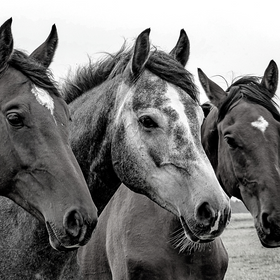
Foal Care - 4 Things You Might Not Know
Foaling seasons is an exciting time of year, especially if it is your first time foaling out mares and working with foals. Foaling and handling foals is an entirely new adventure for many horse owners. It comes with many unknowns that are both wonderful and nerve-racking. As you prepare for your mare to foal this season, here are four things you might not know about foals.
Foals Sleep A Lot
Walking out to the barn and seeing your foal on the ground can cause immediate panic. Were they injured? Are they ill? Did another horse step on them? While you certainly want to ensure none of these is the case, likely, your foal is just sleeping. Foals will sleep for between 10-12 hours per day, significantly more than an adult horse. Foals are using lots of energy to grow, which makes them very tired. Similar to children, they need rest to grow up healthy and strong.
Most horse owners will notice their foals will sleep for long periods during the day. This is completely normal, but you should monitor where they are sleeping. Ideally, you want your foal to sleep in the shade, especially on a hot day. Foals are unable to regulate their body temperatures during the first few months, so it is very easy for them to overheat in the sun. If your foal loves to sleep in the sun, consider keeping your mare and foal inside during the day.
Foals Have a Limited Immune System
Some horse owners will tell you foals do not have an immune system at birth. While it is true they have a very weak immune system; they do still have one. Pre-foaling vaccines for your mare helped to provide your foal with some immunity. Colostrum also provides some initial immunity for your foal, which is why it is so important for your foal to get colostrum within the first couple of hours of birth.
With a weak immune system, foals are very susceptible to infection. Umbilical infections are common in foals and can be life-threatening. To prevent infection, ensure that you thoroughly disinfect your foal’s umbilical cord with iodine or betadine shortly after birth. You can use a small measuring cup to ensure you get the entire umbilicus.
Many Foals Are Born with Bowed Legs
Don’t panic if your foal comes out with bendy-looking legs. This is very common for larger foals or foals born from smaller mares. Foals’ ligaments and tendons are immature at birth, causing many to walk with their fetlocks almost hitting the ground. After several days of walking, you will see the foal become stronger and see their legs straightening.
If you are not seeing an improvement after several days, you should consult your veterinarian. They can provide guidance and advice on various therapies and treatments for your particular foal. There are multiple ways to help support a weak foal’s legs as they grow to ensure they straighten up.





